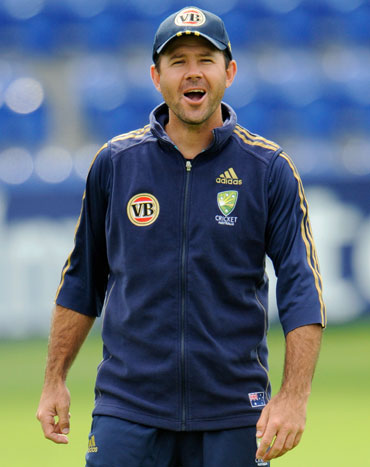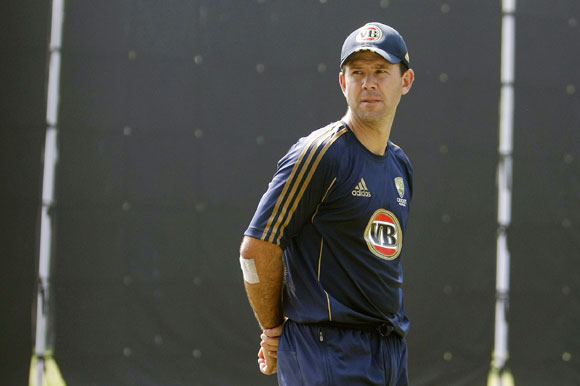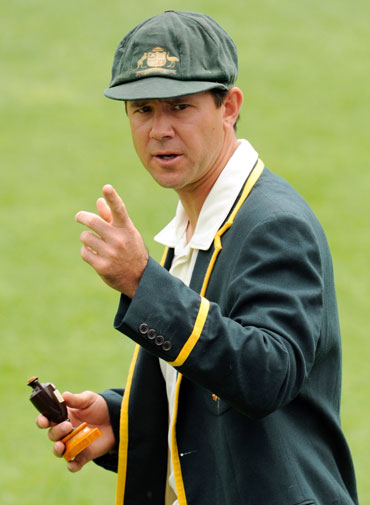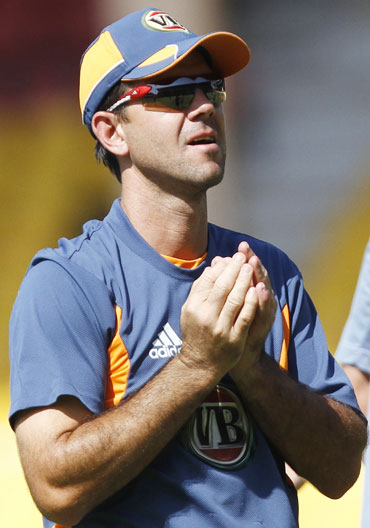As player and captain, Ricky Ponting, says Bikash Mohapatra, was someone who refused to go by the book, didn't shy away from controversy and, yet, more often than not, got the desired results.
Ponting is not about statistics, but impact
However, Ponting is not just about statistics. Punter, as he is called, is, in fact, all about impact. As player and captain, he was someone who refused to go by the book, didn't shy away from controversy and, yet, more often than not, got the desired results.
For someone who inherited a team built by the redoubtable (Steve) Waugh, he carried forward the legacy impressively, though it wasn't smooth sailing always.
However, to his credit, he did just enough to make his own legacy. From having a cakewalk in the 2003 World Cup -- which Australia won unchallenged -- to winning it like a native four years later -- where the holders retained the title undefeated despite having come to the tournament on the back of successive defeats (to England and New Zealand) -- to losing the crown rather tamely in 2011, Ponting witnessed all.
Besides, he also led the men from Down Under to successive ICC Champions Trophy titles – in 2006 and 2009, the only captain to do so.
However, it was the longer version in which he was challenged the most. He led Australia to series wins against all Test-playing nations. The 48 Tests victories mentioned above is a world record, and, certainly, the figure will need much effort to eclipse.
Captain Ponting had two major disappointments
However, sandwiched between the feats are two major disappointments, one of them being the failure to lead Australia to a Test win in India.
Punter captained Australia in five Tests on Indian soil and lost them all.
(Australia did win a Test series in India in 2004, a fourth-match affair under Adam Gilchrist. Ponting missed the first three Tests, two of which Australia won to take an unassailable lead. He returned as captain in the final Test at the Wankhede only to see the side lose, with the ignominy of getting dismissed for 93 in the second essay)
Having said that, his failure in India wasn't exactly unexpected – most Australian captains (save Gilchrist) in the last five decades failed to conquer what Waugh described 'the final frontier'. It was, however, his overall failure in the Ashes that would leave him with rancor.
His first Ashes' series in charge, in England in 2005, witnessed Michael Vaughan's men earning the hosts the urn for the first time since 1987-88.
Ponting's Ashes score: Won 1, lost 3
Ponting's response was brutal. Australia thrashed their eternal rivals 5-0 in the return series. It was only the second Ashes whitewash ever.
However, it was defeat in the two subsequent series that brought Ponting the unwarranted, and somewhat unwanted, recognition of being the only Australian captain to lose three Ashes' series.
More importantly, he failed in both his attempts to win the urn on English soil, something that will, probably, be the biggest regret of his career.
Australia's defeat in the 2010-11 Ashes, coupled with his own form, cost Ponting his Test captaincy. He resigned as ODI skipper a couple of month's later, following his side's failure to retain the World Cup.
However, with many questioning his place in the side, he responded in a manner that defined his class, scoring 544 runs (@ 108.80) in the home series against India, one in which the visitors were blanked.
That will, most definitely, remain his last prolific series.
Ponting's achievements will remain his legacy
Few players in modern cricket offer a dichotomy as Punter. It is easy to eulogize Ponting, the player. By the sheer strength of numbers, and impact, the Tasmanian has cemented his place as one of the great batsmen of all-time.
It is easy to dismiss Ponting, the captain.
Some critics may say his success was the fruit of his predecessor's (Steve Waugh) efforts; others might point out he couldn't make it count when it mattered the most.
However, the point is statistics will always indicate the fact that he was a dual success.
To carry forward someone's legacy is no mean achievement. To his credit, he not only topped Waugh's achievements as captain, but also set many new records en route.
Not many captains could match his credentials. In fact, Ponting is first among equals.
It is these achievements that will remain his legacy.






Comment
article